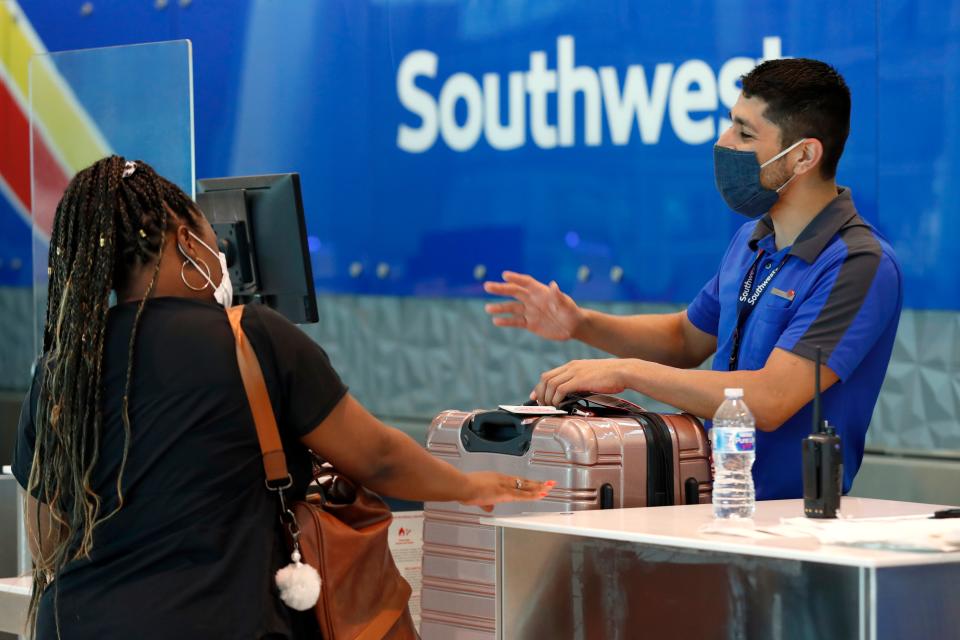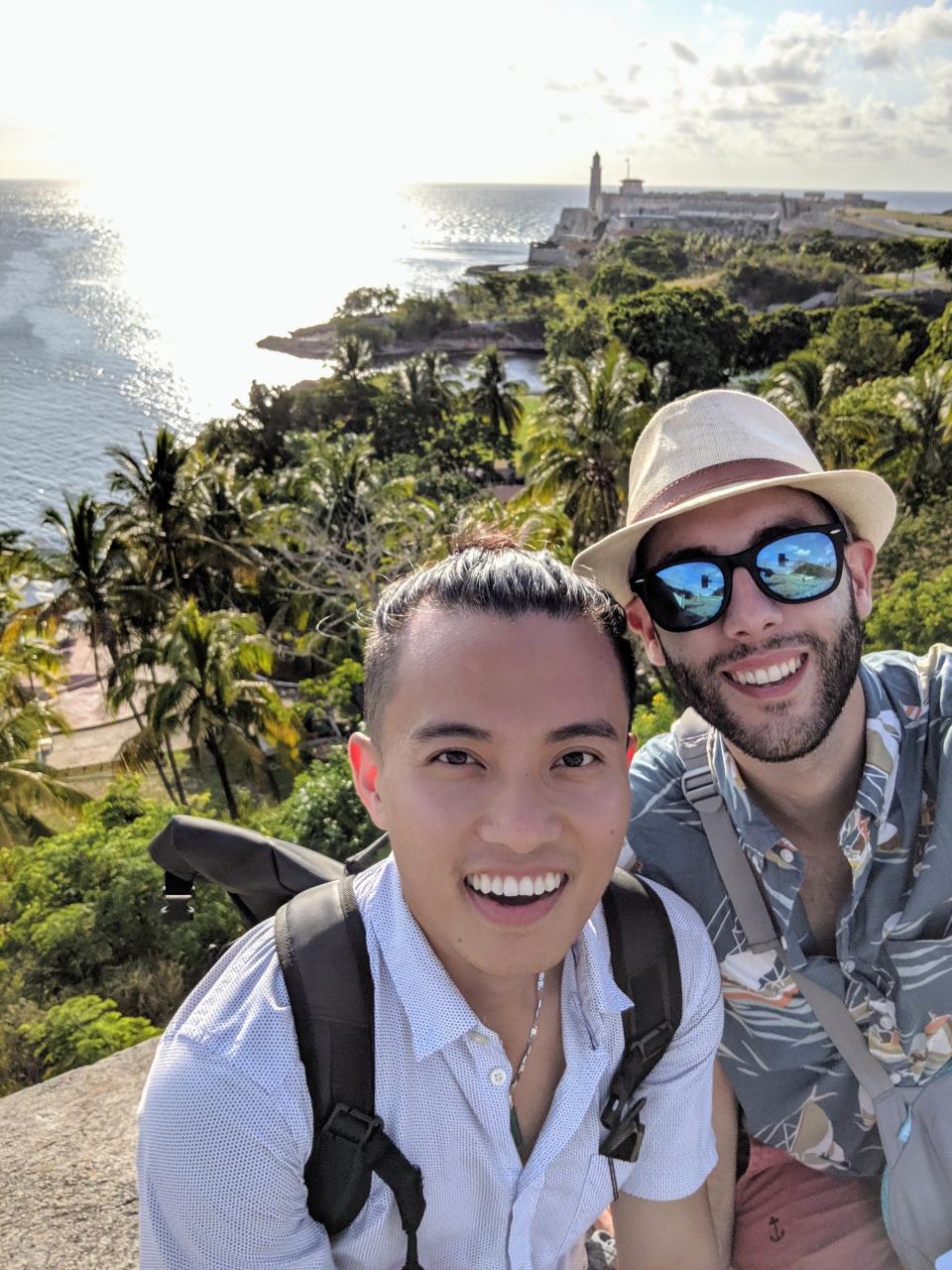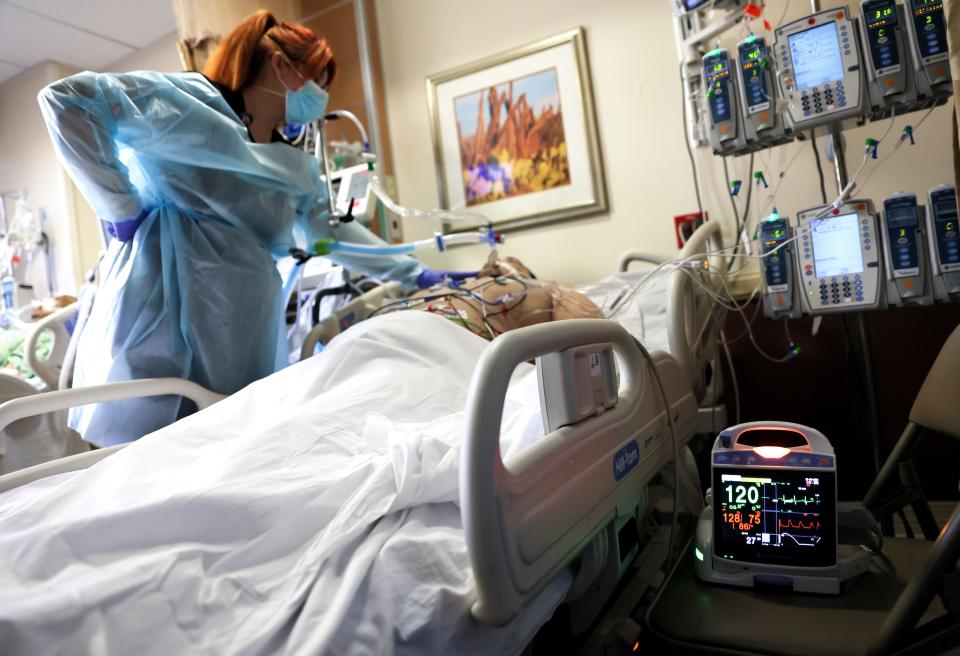'I just didn't feel like it was responsible': Growing number of travelers cancel trips as COVID-19 cases surge
Three months ago, Jackie Henderson of Oregon finally felt comfortable enough with the country’s COVID-19 case counts to book a trip with her husband and three kids to a family reunion in Pennsylvania.
Their trip, scheduled for later this month, has since been canceled. Henderson said her family didn't feel safe traveling with their kids, all of whom are too young to get vaccinated against COVID-19.
“I just thought flying six hours on a plane is like being in a petri dish, and then we're going to walk into this family reunion with about 80 people, and the majority of them are over age 65," Henderson said. "I just really didn't feel like it was responsible for us to do that.”

Henderson joins a growing number of travelers who have been second-guessing plans amid a surge in COVID-19 cases. About one-third of American travelers surveyed by marketing firms Longwoods International and Miles Partnership have postponed travel because of the delta variant, compared to a quarter of travelers two weeks prior, according to the Aug. 4 survey of 1,000 adults.
“Even a little bit of a dip here is concerning for businesses that have already been in a difficult position,” said Tori Emerson Barnes, executive vice president of public affairs and policy for the U.S. Travel Association trade group. “I think we're still very optimistic, and there is still a strong desire for folks to be out there … but we need to get back to a more consistent state.”
►Is it safe to travel?: Some may be better off canceling plans during COVID-19 surge, experts say
Hotels, airlines noticing more cancellations
Optimism around travel has plummeted since early June, hitting a year-to-date low of 20.4% as of Aug. 6, according to surveys of more than 1,200 American travelers from research firm Destination Analysts.
The firm’s mostrecent report found over half of American respondents expect travel to get worse in the U.S. over the next month, and 23% canceled travel plans because of the delta variant.
That attitude shift comes as COVID-19 cases spike across the country, with the highly contagious delta variant making up more than 80% of all cases as of the end of July, according to the Centers for Disease Control and Prevention.
Airlines and hotels are starting to feel the effects.
On Thursday, hotel research firm STR eased its growth projections for 2022, citing a lack of business travel to supersede leisure travel as the summer winds down.
"With more concern around the delta variant as well as delays in companies returning their employees to offices, it’s possible that businesses wait until early 2022 to put their people back on the road,” STR president Amanda Hite said in a news release.
Marriott International spokeswoman Julie Rollend told USA TODAY that the company has seen some cancellations for group bookings later this year that could be related to the spread of the delta variant, but added that cancellations have “slowed significantly” compared to earlier in the pandemic.

Southwest Airlines' outlook for third-quarter revenues dipped after the company noticed an increase in trip cancellations in August, according to a Wednesday filing with the U.S. Securities and Exchange Commission. The company pinned it on the rise of COVID-19 cases.
Glenn Fogel, president and CEO of Booking Holdings Inc., told USA TODAY that the company saw a “modest pullback” in July’s booking trends compared to June, but noted that bookings were still up from the second quarter.
“When infections were going up because of delta, you would see cancellations in those particular areas (with more COVID-19 cases),” Fogel said. “But it doesn't change the long term at all. The long term is pandemics all end. They do. This will end, too.”
Southwest and AAA have both recently noted that Labor Day travel remains strong despite the uptick in COVID-19 cases, and other travel executives have echoed Fogel’s long-term optimism, including United Airlines CEO Scott Kirby.

“Certainly, over the medium to the long term there'll be some ups and downs, but I think that air travel is going to continue to recover,” Kirby told NBC Nightly News earlier this week. “The silver lining of what has happened with the delta variant is it's driving much higher vaccination rates across the country, and at the end of the day, that's the only thing that's going to really get us out of this crisis.”
A little over half of all people in the U.S. are fully vaccinated.
►Tracking COVID-19 vaccine distribution: How many people have been vaccinated in the US?
Travelers' response to COVID-19 delta variant
While many Americans will follow through with plans, the way they travel has changed.
Kyle Baker, 26 of Kansas City, Kansas, has been to Las Vegas four times and Florida once since being fully vaccinated but draws the line at cruises, especially now that COVID-19 cases are up. While he had been considering a cruise trip in December 2019, Baker said watching the COVID-19 outbreak on the Diamond Princess cruise ship unfold in February 2020 was “terrifying.”
“That makes my anxiety go crazy,” he said. “Even at the very beginning of COVID, I was of the mindset of, I’m not going to do a cruise, I wasn’t going to go out of the country. … I’m just scared I won’t be able to get back easily.”
►COVID-19 on a cruise ship: Six cases emerged on my Royal Caribbean cruise. Here's why I didn't panic
Others, like 74-year-old Doris Wright, feel perfectly safe on cruises thanks to their heightened safety protocols. Wright plans to take a 21-day cruise in October.
“I am confident in the new protocols the cruise lines have set up to combat this variant,” she wrote to USA TODAY. “I'm a world traveler and I have been going (nuts) without travel."

Nicholas Sanford of Charlotte, North Carolina, plans to go to Greece with his partner later this month, despite the hassle of having to complete additional COVID-19-related forms to enter and test for COVID-19 before returning.
He added that the two are vaccinated and “regular mask wearers,” which makes him feel more at ease despite reported COVID-19 breakthrough cases.
COVID-19 vaccines are highly effective, but a small percentage of people who are fully vaccinated will still get COVID-19 if exposed to the virus that causes it, according to the CDC. Vaccinated people who have breakthrough infections are much less likely to get severely sick or die.
“When we purchased the tickets, we were both vaccinated, so we felt really confident that this would be fine. ... Now with the delta variant, there’s just more anxiety around the trip,” Sanford said. “Our tickets are nonrefundable, so at this point, we’re going to go and we’re just crossing our fingers.”
►Cruise safety: Six COVID-19 cases emerged on my Royal Caribbean cruise. Here's why I didn't panic
Is it safe to travel during the delta surge?
Amber Schmidtke of Kansas City, who is an associate professor of biology at the University of Saint Mary and former CDC employee, postponed a family vacation to Hawaii two weeks ago.
The vacation was booked in March, and Schmidtke expected a pediatric vaccination to be approved by this point. Without it, she said she doesn't feel comfortable traveling with her unvaccinated child.
Children 12 and older in the U.S. can receive the Pfizer-BioNTech vaccine, but clinical trials on vaccinations among younger children are still ongoing.
“The risks (to travel with an unvaccinated child) just felt much worse than they did a year ago,” Schmidtke said. “The thought of being in a high-risk environment, potentially an airport terminal ... it seemed like a bridge too far.”


►Travel alert: CDC, State Department downgrade travel alerts for Canada
Health experts say travel risks can vary based on many factors, such as vaccination status and the destination's transmission rates.
In an interview with the USA TODAY Editorial Board last week, Dr. Anthony Fauci, director of the National Institute for Allergies and Infectious Diseases, said travelers should follow CDC guidance and restrict themselves to only necessary travel.
The CDC recommends all travelers, regardless of vaccination status, wear masks and self-monitor for COVID-19 symptoms. If they’re traveling internationally, fully vaccinated travelers should also get tested three to five days after travel. Unvaccinated people traveling both domestically and internationally are advised to get tested one to three days before and three to five days after travel and self-quarantine seven days after returning.
Contributing: Jennifer Portman, USA TODAY. Follow USA TODAY reporter Bailey Schulz on Twitter: @bailey_schulz.
This article originally appeared on USA TODAY: COVID travel concerns surge along with delta variant, trips canceled

